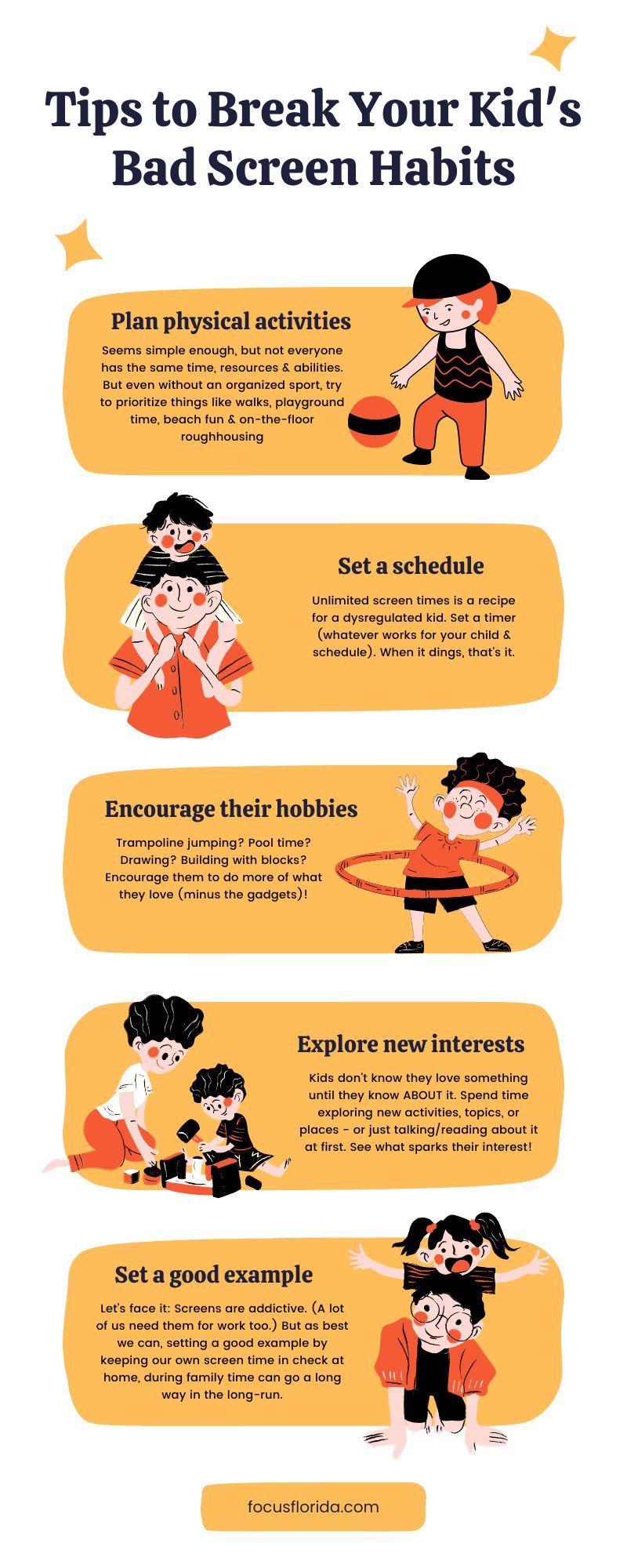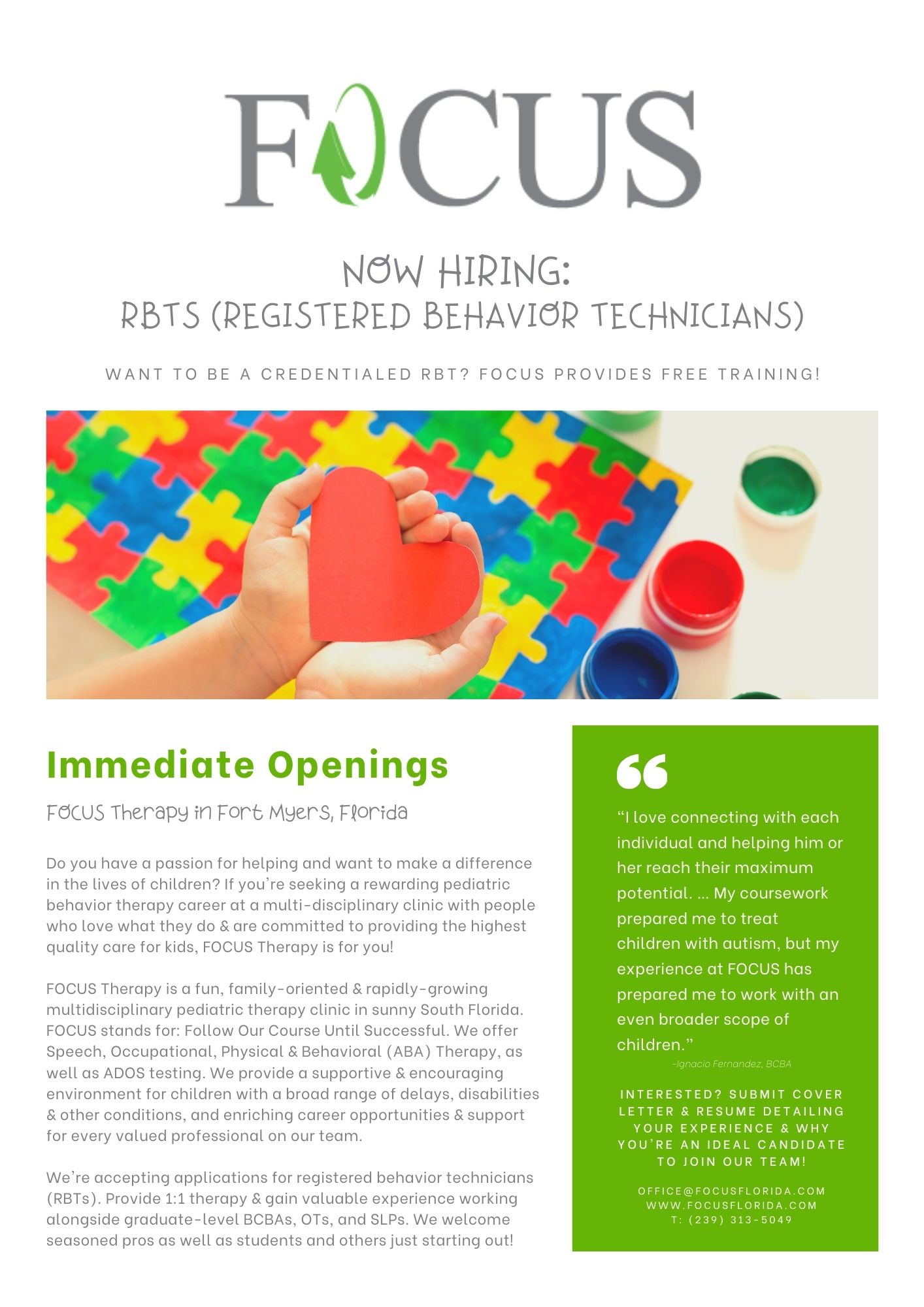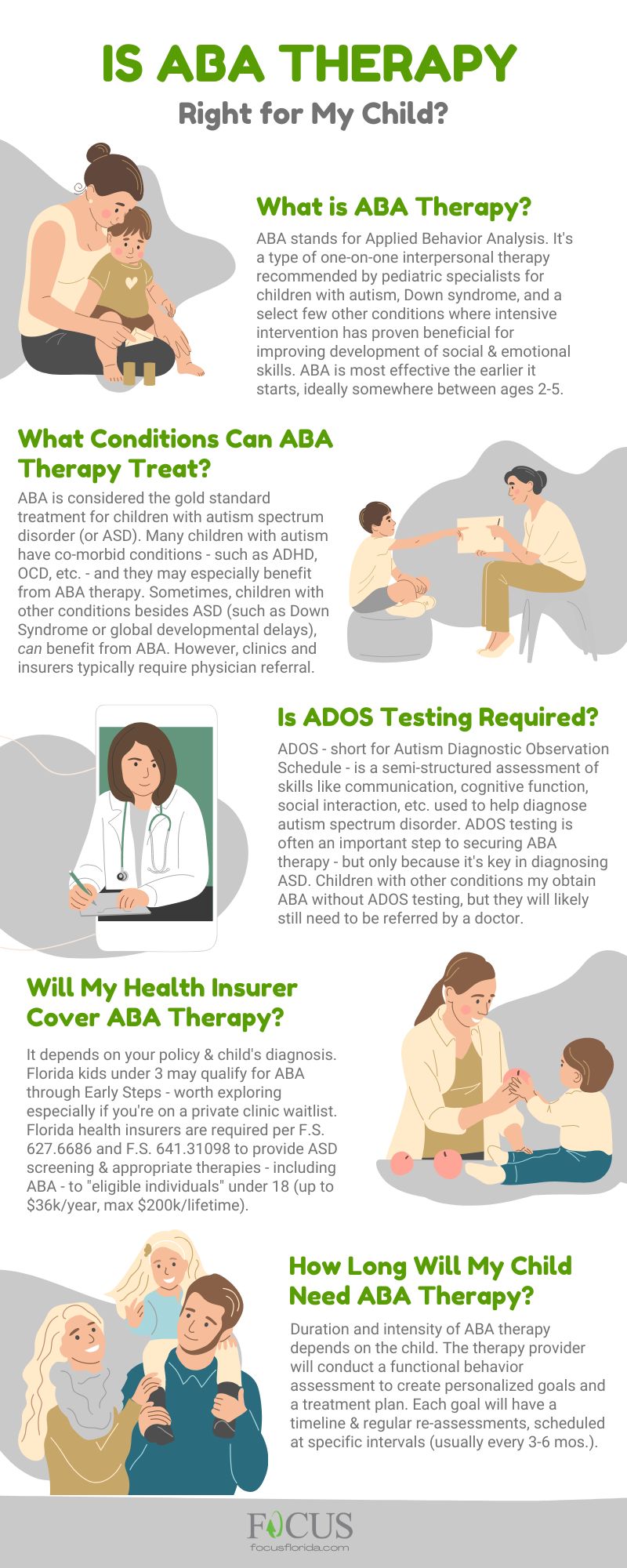Blog
Break Those Bad Screen Time Habits With These Tips From FOCUS Therapy
- Categorized: Articles, FOCUS News
- Tagged: behavior therapy, Focus Therapy, Fort Myers ABA Therapy, Fort Myers occupational therapy, Fort Myers speech therapy, screen time
FOCUS Phone & Internet Down
Our main clinic internet & phones are down at the moment. We apologize for the inconvenience, we’re working to resolve the issue as expeditiously as possible.
- Categorized: FOCUS News
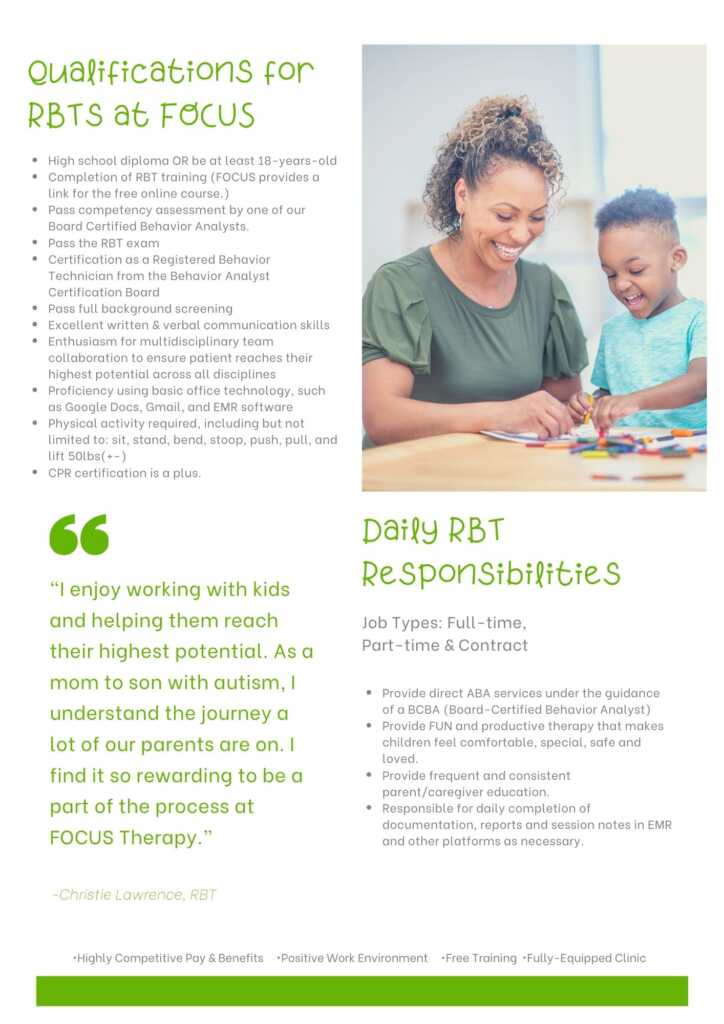
- Categorized: ABA Therapy, Behavior Therapy
- Tagged: behavior therapy, Fort Myers ABA Therapy
How Meds & Pediatric Therapies Together Can Help Kids With Attention/Behavior Issues Reach Maximum Potential
As experienced providers of pediatric therapies in Southwest Florida (specifically, speech therapy, occupational therapy, ABA therapy, and physical therapy), our team at FOCUS Therapy in Fort Myers is sometimes asked whether kids receiving these services might still benefit from medication – or whether kids on medication truly need pediatric therapies.
Short answer? It depends.
Every child, every condition is different. The primary voice of authority, of course, is your child’s pediatrician and specialists. But don’t discount input from the pediatric therapists who are providing intervention services to your child.
As experienced practitioners who each work with dozens of kids daily: We generally do not recommend medication as the first treatment option for a lot of children diagnosed with conditions like speech-language delay, developmental disabilities, certain neurological/neurodevelopmental conditions, and behavioral health issues. BUT – sometimes, for certain kids – pediatric therapies in combination with medications can do wonders in helping the child reach their maximum potential.
We encourage parents to keep an open mind, ask questions, and maintain an ongoing dialogue with their kids’ doctors and pediatric therapists.

What Type of Medications Are We Talking?
Obviously, if a child has a health condition like epilepsy or congenital heart disease or diabetes – the medications they take are typically far less of a controversy/up for debate.
What we’re mainly referring to here are medications prescribed for conditions related to lack of attention/focus/behavioral regulation. These include prescriptions like Adderall, Dexadrine, Focalin, Ritalin, etc. It might also include antipsychotic medications recommended for behavioral issues, such as Risperdal.
There isn’t a black-and-white answer that’s going to work for every child, every condition, or every age. The reality is choosing the right treatment for your child can be complicated. We fully understand that. Parents of kids with co-morbidities (Autism Spectrum Disorder, Attention-Deficit/Hyperactivity Disorder [ADHD/ADD], Down Syndrome, intellectual disabilities, etc.) – they often have to make tough choices about the best combination of care needed to help their kids thrive.
Where to Start: Therapy vs. Medication
Jennifer Voltz-Ronco, MS/CCC-SLP and FOCUS Therapy Owner & Founder, has nearly two decades of experience in pediatrics. She’s also a parent and has herself been diagnosed with ADD (for which she receives medication). She generally advises parents to start with the least invasive treatment, and then go from there.
“Medicine generally isn’t what I would consider the first ‘go-to’ for small kids,” Voltz-Ronco says. “When it comes to young bodies and developing minds, It’s best to begin with therapy because not only is it often extremely effective, it’s usually the least invasive. So my recommendation is: Let’s start there. Let’s see how much progress is possible before we move on to the next level – if needed.”
Providers of pediatric therapies will be carefully watching every child’s progress at each phase. They’re going to be closely observing the mental/physical/behavioral/emotional barriers to progress. Parents are going to get daily reports on the successes – and ongoing challenges – to goals for communication, socialization, independent function, academics, etc. If they notice an issue: You’re going to know about it.
Some key phrases Voltz-Ronco says to watch for from your child’s pediatric therapists, teachers, and caregivers:
- Lack of focus
- Significantly decreased attention
- Constant distraction by others
- Routine distraction by sounds, items, etc.
“You start hearing phrases like this, then it’s time to have a discussion with your child’s physician,” she said.
“In general, I would avoid going full-tilt with medications before kindergarten. You want to give their brain a chance to develop for a few years before diving in. See how formal education plays a role. Maybe the child just needs more movement in the day? Maybe they just need differently-structured instruction? Maybe we can successfully adjust the way they’re taught, rather than demanding they conform to every element of a ‘typical’ classroom.
“But, if you’ve tried all these alternatives and the child STILL struggles with attention issues (with or without hyperactivity), then maybe you start to discuss medication.”
Tips for Parents Considering Medication
Medication isn’t a one-and-done solution, either. There are likely to be adjustments in doses, alternatives, etc.
Some general thoughts for parents:
- Keep an open mind. Be willing to consider new information from experienced professionals.
- Ask lots of questions. If something doesn’t make sense to you or you have concerns: Ask. Speak up. Be an advocate for your child. Trust the experience of your child’s doctor/psychiatrists – but don’t ever allow someone to make you feel like your confusion is invalid or your concerns are unworthy of addressing.
- Keep your child’s pediatric therapists in the loop. We want to help. We’re not “pro-medication” or “anti-medication.” We’re Pro-YOUR CHILD. Our speech, occupational, ABA, and physical therapists at FOCUS – along with your child’s doctors, teachers, caregivers, etc. – we’re on the same team. We also trust that YOU know your child best. We’re here to support you. If you aren’t ready to start your child on medication: We have your back, and will provide additional supports as needed. If it’s something you’re considering, we’ll offer our honest, frank insight and support.
If you have questions, we’re happy to offer our insight.
FOCUS offers pediatric speech, occupational, physical, and ABA therapy in Fort Myers and throughout Southwest Florida. Call (239) 313.5049 or Contact Us online.
Additional Resources:
Children and the Use of Complementary Health Approaches, National Center for Complementary and Integrative Health
More Blog Entries:
ABA Therapy: Is It Right for Your Child? Jan. 11, 2022, Fort Myers Pediatric Therapy Blog
- Categorized: Articles
How ABA Therapy Can Help Kids
If you have more questions about how our Fort Myers ABA therapy team can help your child, contact us!
FOCUS Therapy offers ABA therapy and ADOS testing to children in Lee County, Florida.
Call (239) 313.5049 or Contact Us online.
- Categorized: ABA Therapy, ADOS Testing
SWFL Speech Therapy Treatment for Kids With Childhood Apraxia of Speech
When it comes to treatment for childhood apraxia of speech, our Fort Myers speech therapists employ treatments that are both evidence-based but also fun and tailored to the individual child.
Apraxia of speech is a relatively uncommon speech disorder, but one our dedicated SWFL speech therapy team is especially qualified to treat, having extensive experience in helping kids with this condition successfully master key skills.

What is Childhood Apraxia of Speech
Not all kids with this condition are going to have the same signs and symptoms include:
- Won’t say the same words the exact same way each time.
- Stresses the incorrect word in a sentence or syllable in a word.
- Changes or distorts certain sounds.
- Speaks shorter words with greater clarity than longer words.
Kids with apraxia of speech might also have a tough time with fine motor skills, reading, writing, and spelling.
Treatment Methods for Childhood Apraxia of Speech
There are several speech therapy treatment methods used to treat apraxia of speech in children.
Among the treatment methods recommended by the American Speech-Language Hearing Association (ASHA) for childhood apraxia of speech:
- Articulation Therapy: This therapy focuses on teaching the child to produce speech sounds correctly by breaking down speech sounds into smaller units and practicing them individually. The therapist will also work on improving the child’s ability to coordinate movements for speech.
- Sensory-Motor Approach: This approach uses sensory-motor techniques to help the child develop the oral-motor skills needed for speech. The therapist may use activities such as blowing bubbles, blowing pinwheels, or playing with play-doh to help the child improve their oral-motor skills.
- Prosody Therapy: This therapy focuses on improving the rhythm and melody of speech, which is particularly important for children with apraxia of speech. The therapist will help the child develop a natural-sounding speech pattern by working on stress and intonation patterns.
- Cueing and Assistance Techniques: This approach involves using cues, such as gesturing or pointing, to help the child initiate speech. The therapist may also use physical assistance, such as holding the child’s jaw or lips, to help the child produce speech sounds correctly.
It’s important to note that each child with apraxia of speech is unique. Every treatment plan will be tailored to their specific needs. Treatment for apraxia of speech may take several months or even years, and progress can be slow. That said, with consistent and dedicated therapy, children with apraxia of speech can make significant improvements in their speech.
In conclusion, apraxia of speech is a complex disorder that requires a multi-faceted approach to treatment. Articulation therapy, sensory-motor approach, prosody therapy, cueing and assistance techniques, and speech-language pathology treatment are all effective methods for treating apraxia of speech in children.
Working with a dedicated SWFL speech therapy team is essential to ensure a child with this condition receives the best possible treatment and support. With consistent and dedicated therapy, children with apraxia of speech can make significant improvements in their speech, which will help them to communicate effectively and be more confident in their daily lives.
FOCUS offers pediatric speech therapy in Fort Myers and throughout Southwest Florida. Call (239) 313.5049 or Contact Us online.
Additional Resources:
Why Act Early if You’re Concerned about Development? U.S. Centers for Disease Control and Prevention
More Blog Entries:
The Best Age for Fort Myers Speech Therapy? Mind the Milestones., Nov. 3, 2022, Fort Myers Speech Therapy Blog
- Categorized: Articles
ABA Therapy: Is It Right for Your Child?
ABA therapy is a relatively new area of practice, but it’s widely recognized by pediatric specialists as a highly effective form of early intervention for children on the autism spectrum.
ABA – short for applied behavior analysis – is a type of one-on-one behavior therapy that’s based on learning theories. It helps boost a child’s independence and overall quality of life – short-term and long-term – by providing evidence-based guidance and support for the development of social and emotional skills. Unexpected or dangerous behaviors are reduced, while helpful/expected behaviors are positively reinforced.
Experts have concluded the earlier it starts, the more effective it is. Ideally, kids will begin ABA somewhere between ages 2 and 5, though it’s not unheard of for a child to start younger or a bit older.
While many children may struggle with “behavior issues,” ABA therapy is uniquely reserved for children with specific diagnoses for which this intensive, interpersonal therapy has proven beneficial. It’s considered the “gold standard” for autism treatment, but can also be great for helping children with conditions like Down syndrome or global developmental delay.
Insurance companies in Florida are required by law to cover medically necessary therapies – including ABA therapy – for children with autism, Down Syndrome, and other “eligible” conditions, though the exact diagnostic codes that would qualify a child aren’t expressly defined in the statute. What we can say is that kids who do not have a diagnosis of autism, Down syndrome, or developmental delay will have a tougher time securing insurance coverage.
We know this can be a bit confusing for families. At FOCUS, we’re committed to providing the best answers and insight we can, and to helping parents navigate this process.
FOCUS Therapy offers ABA therapy and ADOS testing to children in Lee County, Florida. Call (239) 313.5049 or Contact Us online.
- Categorized: ABA Therapy
7 Super Awesome Benefits of In-Clinic ABA Therapy for Kids in Southwest Florida
Many ABA therapy providers in Southwest Florida share similar approaches and philosophies with respect to evidence-based methodologies and evaluation standards. That said, there are different schools of thought when it comes to the optimal treatment setting – whether that’s in-clinic, at school, at home, or some hybrid combination. At FOCUS Therapy in Fort Myers, we prefer in-clinic ABA therapy for our patients – and there are tons of good reasons why.
ABA stands for Applied Behavior Analysis. It’s widely recognized as one of the most highly-effective, child-oriented, results-driven therapy for kids diagnosed with autism spectrum disorder. It’s also proven very helpful for kids with traumatic brain injuries, oppositional defiant disorder, obsessive compulsive disorder, attention deficit/hyperactivity disorder, and Down syndrome. These conditions don’t have a “cure,” per se. What ABA therapy does is teach appropriate/safe/expected behaviors while minimizing and extinguishing inappropriate/unsafe/unexpected behaviors. Individual target goals may differ, but most long-term goals involve improving kids’ independence, safety, social skills, academic participation, and community engagement.
Although the skill of the therapist is certainly important, so too is the setting where therapy is provided.
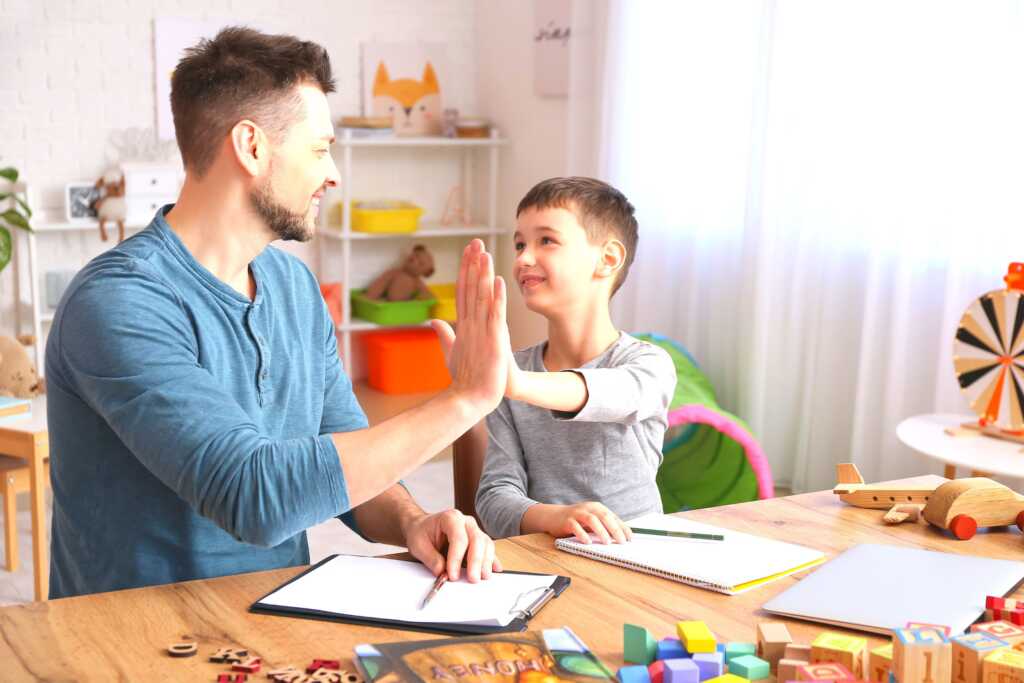
Among the many upsides to Southwest Florida in-clinic ABA therapy:
- Easier transitions to (pre)school. For most families, the goal is for their child to ultimately transition to a mainstream learning environment. In-clinic ABA therapy can better prepare kids for that transition, structuring environments that more closely mirror their experience in school so that their skills are more easily generalized.
- More opportunities to teach and learn social skills. When our registered behavior technicians (RBTs) and board-certified behavior analysts (BCBAs) are working with children in the clinic, there are going to be inherently more opportunities for social interactions – both with peers and adults. We can practice key skills like turn-taking, recognizing social cues, and self-regulation/coping skills.
- Better quality of care and supervision. This is not to say at-home ABA therapy providers don’t provide adequate care. But when we have multiple RBTs, BCBAs, speech therapists, occupational therapists, physical therapists, and support staff on-site, there are simply more eyes, ears, and hands if challenges arise. Plus, it gives supervisors the opportunity to regularly observe, make recommendations, and ensure treatment is on-track. They can see what’s happening in real time (rather than relying on RBT notes after the fact) and are able to make immediate modifications as necessary.
- Multi-disciplinary setting. Lots of the kids we treat at FOCUS require numerous therapy interventions. If your child needs ABA therapy, speech therapy, occupational therapy, and/or physical therapy, you can get all of that in one location. But parent convenience is just part of this benefit. When you have highly-skilled pediatric therapists in a broad range of disciplines all working in close proximity to each other, it creates opportunities to learn from each other. A speech therapist might notice an issue in passing that an RBT wouldn’t have immediately identified – and offer possible solutions. Those kinds of interactions and collaborations happen all the time – and we encourage them because kids get optimal benefits when we approach treatment from the “whole child” perspective.
- Tons of positive reinforcers. Every parent can recall at least one time their child was super into something – and then just suddenly decided they were ALL SET with it. Like, all they want to eat every single morning is a strawberry Pop-Tart, so you eventually go all-in and buy the Costco size – only for them to decide two packages in, they never want to see another strawberry Pop-Tart for as long as they live. Reinforcers in ABA therapy can be like that too. These are the unique-to-each-child incentives used to encourage interactions and activities that allow us to target behavior goals. But what a child was willing to work for one day might no longer interest them the next. With in-clinic ABA, the therapist has immediate access to TONS of alternative reinforcers – games, puzzles, books, sensory gym, etc. We can quickly find the “next best thing” and go from there.
- Easier transitions when there are staff changes. As much as we love and value our amazing ABA therapists, they don’t always stay forever. For these kids, transitioning from one therapist to another can be a major challenge. But when kids receive behavior therapy in a clinic setting, there’s a good chance that their new therapist is a friendly face they’ve already seen and directly interacted with.
- In-clinic ABA therapy works. Like, really well. While there’s no one-size-fits-all approach that works for every kid in every therapy, it’s been our experience that in-clinic ABA provides the most “bang for your buck” in terms of results – and a conclusion solidly backed by research. Just one example: A National Institute of Health study analyzed the effectiveness of at-home ABA therapy vs. in-clinic ABA therapy. They controlled for variations in individual child skill sets by treating the same group of kids in both settings at different times, and then tracking their progress during each. Kids treated in-clinic mastered 100 percent more skills-per-hour compared to those treated in their homes.
With in-clinic ABA therapy at FOCUS, we’re able to provide the best quality therapy in a setting that is welcoming and fun as well as structured and safe. If you have questions about our therapy services or Fort Myers ADOS testing, reach out!
FOCUS offers ABA therapy and ADOS testing to children in Lee County, Florida. Call (239) 313.5049 or Contact Us online.
Additional Resources:
What Is Applied Behavior Analysis? June 23, 2021, Medically Reviewed by Jabeen Begum, WebMD
More Blog Entries:
Top 4 Benefits of In-Clinic ABA Therapy, April 2, 2022, Fort Myers ABA Therapy Blog
Common Child Speech-Language Disorders & How Fort Myers Speech Therapy Helps!
If you’re concerned that your child may have a speech-language disorder – you aren’t alone. The American Speech-Language Hearing Association (ASHA) estimates 8 percent of U.S. kids ages 3 to 17 (about 1 in 12) have a disorder related to speech, voice, language, or swallowing. Kids younger than 3 can be diagnosed with speech & language disorders and delays too. As dedicated providers of Fort Myers speech therapy for kids, we can firmly attest to the remarkable positive impact of early intervention therapies. Children whose speech & language disorders are identified and treated very early are more likely to have no discernable communication issues as they get older.
The effectiveness of your child’s Fort Myers speech therapy (and other early interventions like ABA therapy and occupational therapy) depend on a number of factors, including:
- The type and severity of the underlying condition(s).
- The age of the child when intervention begins.
- The intensity of the intervention schedule (length and frequency).
- At-home reinforcement and consistency.
Our knowledgeable, dedicated team of Southwest Florida speech-language pathologists at FOCUS Therapy is well-prepared to treat children with a broad range of delays and disorders. That said, there are some pediatric speech-language deficits that are more common than others.
Among those:
- Speech or articulation delays. While you might hear the terms “speech” and “language” used a bit interchangeably, they’re technically different skills. Speech is the mechanical or motor aspect of talking. Common speech and articulation delays among kids include things like stuttering, incorrectly combining sounds, or difficulty pronouncing words. Sometimes there is a physical reason for this (like a cleft palate), but the cause isn’t always clear. Some speech delays are related to global developmental conditions, like autism spectrum disorder or Down syndrome. Other times, they crop up as a singular issue. Speech and articulation delays may not require intervention, but it’s important to consult with a pediatric speech therapist before making that call.
- Expressive language disorders. These are conditions that involve problems with verbal expression. Often, these are conditions where kids may have difficulty formulating their thoughts or combining words to form a complete thought or sentence. Speech-language therapists can help kids with expressive language disorders by clearly identifying the issue, and then helping the child work on sound-letter associations, phonics, and pre-literacy skills.
- Receptive language disorders. Sometimes referred to as language processing disorders, these are conditions where the child can hear perfectly find, but they have difficulty decoding the meaning in their brains. Sometimes, language processing disorders may be initially misdiagnosed as speech delays, because they look very similar early on. Another reason parents and caregivers might miss receptive language disorders is because so much of early language is repetitive and can be memorized. For example, if you regularly say, “time for your bath!” your child may recognize the sound pattern and march themselves to the bathroom, but it doesn’t mean they necessarily understand the individual components of that sentence: “time,” “your,” and “bath.”
- Social and pragmatic speech disorders. Effectively using language in the correct context during social situations is a skill we call “pragmatics.” Kids who have social pragmatic communication disorder have difficulty with verbal and non-verbal communication that can’t be explained by low cognitive ability. They might talk nonstop without recognizing the other person isn’t engaged or listening. They might interject at inappropriate times or with non sequitur responses. They may fail to “take turns” when talking, or fail to make eye contact, or breeze over certain social “rules” most of us recognize as inherent to communication in social settings.
- Voice disorders. About 5 percent of kids have chronic voice disorders. These involve difficulty with voice pitch, volume, quality, etc. One’s voice may sound hoarse or harsh, too high or low, too loud or too quiet, etc. Causes vary, but can include polyps and nodules on the vocal chord, infections, acid reflux, poor movement of vocal folds, etc. Speech therapy exercises can be helpful for children with weak voices and other voice disorders.

Why Early Intervention Fort Myers Speech Therapy Makes a Difference
Years ago, pediatricians tended to adhere to a “wait-and-see” approach, which basically involves hanging back and waiting to see if concerns about speech-language development were still lingering once a child hit school-age. That has largely shifted in favor of early diagnosis and treatment of speech-language disorders because research has shown more effective results with treatment the earlier interventions begin.
Researchers examining the reason behind early intervention’s effectiveness have largely concluded that the younger the child, the more malleable their brains. As noted by the CDC, these “neural circuits” are the connectors in a child’s brain. They are most easily adaptable during the first 3 years of life. For kids with speech-language delays and disorders, those neural circuits are often missing key connections. Early intervention helps reroute them.
Children begin recognizing recurring speech patterns during their first year of life. Babies 12-18-month-old can usually understand at least a few words in the absence of gestural or other cues. They can also usually produce at least a few intelligible words. These combined skills show them acquiring both expressive and receptive speech-language skills.
Of course, spotting a speech problem in a 2-year-old is a bit trickier than in a 6-year-old. That’s not to say evaluations should wait. It’s just that toddlers as a whole are only just starting to grasp speech patterns, so things like lisping and slurring and mispronunciations are fairly common. That’s why often with younger kids, our speech therapists are less concerned with the accuracy of their word articulation and more focused on whether and how they’re trying to communicate. If they’re older than 1 and not using any words, that could be cause for concern – particularly if they aren’t using gestures, displaying a understanding of what’s being said to them, or showing any notable response their own name. Those can be an indicator of bigger issue – possibly autism, but also maybe non-related speech-language delays or disorders. In any case, it’s better to have them evaluated sooner than later.
Another way to think about early intervention speech therapy: Early on, missed speech-language milestones will be counted in months. But let enough time go by without treatment, and the delay will compound by years. A child who receives Fort Myers speech therapy at 18 months may be 6 months delayed, while another child with similar delays but doesn’t start treatment until they are 3 will be 1.5 years behind. The earlier a child starts receiving therapy, the better chance they have to catch up sooner.
If you have additional questions about early intervention speech therapy for your child, we offer initial consultations as well as comprehensive speech-language evaluations and ADOS testing.
FOCUS offers pediatric speech therapy in Fort Myers and throughout Southwest Florida. Call (239) 313.5049 or Contact Us online.
Additional Resources:
Why Act Early if You’re Concerned about Development? U.S. Centers for Disease Control and Prevention
More Blog Entries:
The Best Age for Fort Myers Speech Therapy? Mind the Milestones., Nov. 3, 2022, Fort Myers Speech Therapy Blog
- Categorized: Speech Therapy
- Tagged: Fort Myers speech therapy, speech therapy

